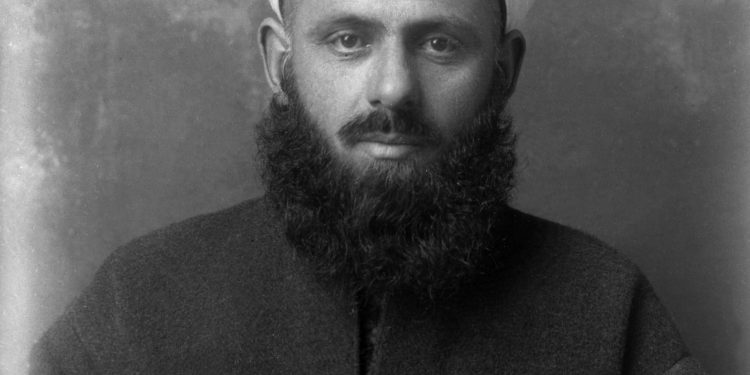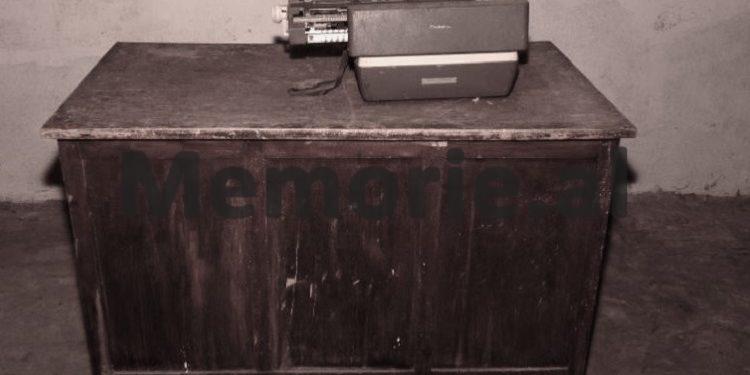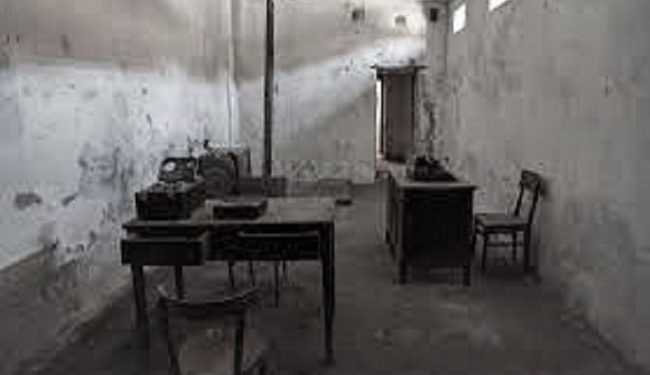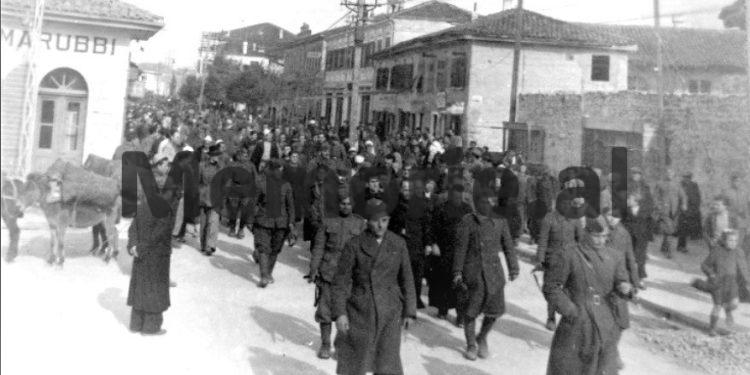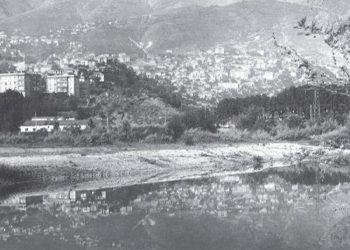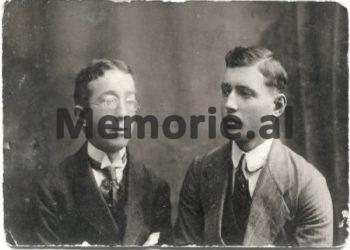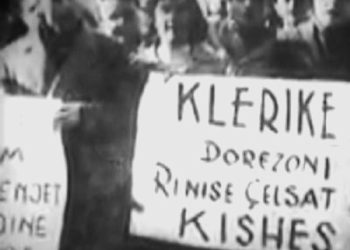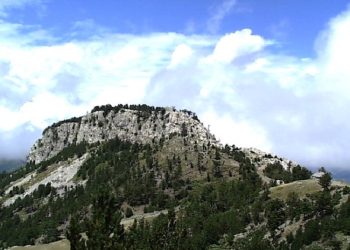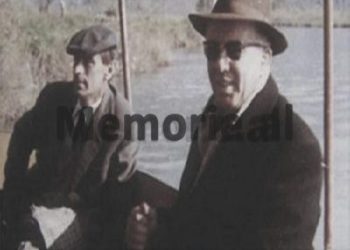The first part
Memorie.al / The old people knew well Hafiz Musa Dërguti, that hodge respected by all, notable for his deep piety, that hodge who was always close to the needy, close to people’s problems and worries. Wherever there was a problem, wherever there was a dispute in the families of Shkodra and the surrounding area, Hafiz Musaja would be found, with his word, his kindness and his authority, to calm the wounded hearts, to quench the heated blood, to reconcile and bring brother to brother, husband to wife, family to family, tribe to tribe. And he did all of this for God’s sake, sacrificing precious time, regardless of fatigue and hardships, often bearing heavy expenses.
His dedication and piety, accompanied by the will and numerous and unrelenting efforts, made the knowledge and skills in directing religious activities in the neighborhood where he served, in the mosque of Shaban Efendi, more and more closely connected with the life of the people. , with his preoccupations and troubles.
And these troubles of daily social life, in certain cases took on a strong patriotic and political character, therefore Hafiz Musaja, although a pious cleric, became a spiritual leader in many areas of social activity, mainly family life, but also a warrior with a weapon in his hand, against the invader, an indomitable opponent against that anti-national ideology, against communist politics and ideology, against atheism, which like a plague passed over our country.
In his memoirs, Tom Lec Marku, a co-sufferer of Hafiz Dërgut in the prisons of the communist dictatorship, writes: “He was religious and not a fanatic, for him every person, whether Catholic or Muslim, was God’s creation. Strong, honest, courageous no more, dai (giver), he gave to everyone what he had. I was a patriot, a collaborator of the Opposition, a staunch anti-communist. That’s how I knew Hafiz Musa Dërgut.
Musa Dërguti was born in Shkodra, on 3.3.1888, in an old Shkodra family. Ethem Dërgut’s house used to be in the well-known “Dërgutej” neighborhood, where one of the oldest mosques in the city was located. Many prominent families lived in this neighborhood, which left indelible traces in our national history, such as the Dervishes, the Sokols, etc. Ethemi, Musa’s father, with sweat and honest work, would add honor and wealth to the family.
He would raise honorable sons and outstanding workers, who stood out in Shkodra Bazaar, where they had seven of their own shops, where they mainly sold Dairy and other foodstuffs, not to mention the lands (fields and meadows), in “Mëhallën e Re” (on the shore of the lake) and especially in the village of Trush, where herds of cattle, mainly cows and sheep, grazed. In this environment of honest work, in this environment of education of an honorable civic and religious tradition, Musai grew up, who would later become one of the most respected imams of his city.
Among the four sons of Ethem Dërgut, Abdyl, Zyber, Musa and Qamil, only the third son devoted himself to religious theological studies, overcoming the steps of preparation in this honorable field, but which required a special dedication. Musa received his initial lessons in the bosom of his family, but also in the mejtepe of the “Ndocej” neighborhood, a meytepe that even the oldest school would bow down to him with respect, because here the honorable sons of many families learned prominent of our city.
We remember the Boksi family, from whose bosom came the famous Haxhi Idrizi, the Muftia family, from which came all those myderriza and muftis, the honor of the city and the whole of Albania. We remember Sali Efendi the Great, Abdullah Efendi the Mufti, Sali Efendi the Mufti, the Repishti family, we remember the prominent Myderrizi, Hafiz Ibrahim, the Kraja family, we remember the aforementioned theologian Hafiz Ali; the Bomnori family, and who does not remember Haxhi Sheh Shaban Damnori with respect; the Kruja family, we remember the mystic and warrior, Sheh Ali Kruja, etc., etc.
Here Musaja gained the impetus to continue further studies in the various fields of Islamic knowledge. He continued his studies at the Pazar Madrasa, where many personalities of Islamic culture worked and studied, which had been the arena of all those efforts to fight against the Turkish invaders and the predatory masters of Montenegro and Serbia. When the traces and wounds of the wars had not yet been closed in Shkodër, the young boy (Musaj) began his studies.
Seeing his diligence in his studies, starting from the Shkodra tradition of sending the best students to study in Istanbul, which was not only the capital of the Turkish Empire, but also the capital of culture and knowledge, Musa was sent to continue school, thanks also to economic opportunities.
For the preparation of students, for the opening of madrassas in the country or for foreign scholarships, the Turkish conqueror has never given subsidies. It was the citizens of Shkodra themselves who opened the mejtepets or madrassas, they themselves at the expense of the family or, with the help of charities, sent their sons to study.
Despite our interest, the family has not been able to provide us with the certificate of graduation from the madrasa, which does not surprise us at all, considering the sufferings the entire family of Hafiz Musa went through, in countless prisons and exiles, in all the years of Albania. In Istanbul, Hafiz
Musa got to know the culture and wide knowledge of Islam, gained serious religious training, got to know the life of a great political, economic and scientific center. Of course, nothing beautiful and magnificent that he experienced in Istanbul did not surprise the Albanian student. He, like many others before him, had his mind on distant Shkodra. There the family was waiting for him, there the task of spreading the good word, peace and kindness among people was waiting for him.
It didn’t even occur to him to forget, after a noisy life in the capital, on the contrary, he was attracted by the tranquility of his own city, with all the good things that the idea of serving the people brings, of high human ideals, which were embodied in the verses of Kur Magnificent ‘anit and in the Hadiths of the Prophet a. s. The young man, with full dedication and determination, returned to his homeland, returned to Shkodër, near his family and friends.
He began his religious duties at the mosque of Shaban Efendi. This was a very old mosque in our city, which was demolished and on its grounds, a carpenter’s workshop was later built, in the “Salo Halili” neighborhood, known by the old residents of Shkodra, in a part of her as the neighborhood, “Shaban Efendişe”.
We do not know if the neighborhood took the name of the mosque, or the other way around. It is a rare case that, here he began and here he finished his duty, serving the residents of that neighborhood, which was the border with the neighborhood where the venerable hodja lived. Until he was arrested, here he prayed, here he led the residents as an imam, here he preached every Friday, here the residents of the neighborhood listened to the wise and hopeful words of Hafiz Musa.
This mosque on the southwestern edge of the city became very popular, especially for the women of all the surrounding neighborhoods. In Hafiz Dërguti’s lectures on the family, on the role of the mother in education, on marital relations, on the relations and duties of parents towards children and, of children towards parents, on relations with neighbors, with relatives and with everyone else in society, he created aroused a lot of interest in the women of Shkodra, so that the mosque was always full, and Hafiz Dërgut’s words evoked hope, kindness, peace, family harmony, understanding and love among people.
Hafiz Dërguti was not specialized in sociology, but living among the people, whom he loved so much, in their joys and sorrows, he sought to soften people’s hearts a little, ease their pains with the source of the teachings of the Islamic faith. , which life often causes, to direct and illuminate the path towards goodness, truth, justice and understanding, towards the path preached by the Islamic religion.
And this made him very dear to every Shkodra family. He was welcomed everywhere, his word was respected and respected. Wherever he went, there was a ray of hope, a source of human understanding and harmony. Hafiz Musa Dërguti, always being close to his people, lived with his troubles, was by his side even in the most difficult moments, not only with his persuasive words, but, when necessary, even taking up arms, for the interests national.
He thus followed an early tradition of prominent religious leaders, such as: Ahmet Efendi Kalaja, Sheh Shamia, Sali Efendi Hylja, Daut Boriçi, Jusuf Efendi Tabaku, Haxhi Idriz Boksi, Haxhi Hafiz Abaz Golemi, etc., who, on occasions danger for the homeland, besides the proverb, they had taken up arms in the war against the Turkish, Serbian and Montenegrin invaders.
In August 1920, Serbian-Montenegrin military forces occupied Kelmendi, Kastrati, Shkreli and Koplik. To face the Serbian-Montenegrin aggression, more than 3000 Albanian fighters, who came from Shkodra and other districts, lined up at the front. Among them was Hafiz Musa Dërguti, who, as they say, fought with rare bravery.
He became an example of courage and manliness, facing many difficulties and dangers. Contemporaries show that, when a comrade of the war was seriously wounded, Hafiz Musai took him out of the battle, through the barrage of bullets, and carried him by his arm from the hills of Mosek, to the Shkodra hospital.
This act of bravery and sacrifice is still fresh in the memory of contemporaries. The years 1920-1924 are full of political tensions. Shkodra is a hotbed of marked events that our country went through. Hafiz Musai takes an active part in these events and supports the opposition forces. After the overthrow of Fan Nol’s regime, approximately after 3-4 weeks, he was arrested and kept in a state of arrest for nearly 2 months.
Hafiz Ibrahim Repishti, Dom Pjetër Tusha, from Shiroka, etc., were also imprisoned with him. With the intervention of the high Muslim clergy, he is released from prison. When communist ideas begin to spread in our country, Hafiz Musai understands their danger and becomes a determined fighter against this ideology, with so many consequences for our country.
Since 1925, the communist ideology has been unmasked by many prominent Khoxallars. We can recall here the articles of Hafiz Ali Korça or the well-known book of Hafiz Ali Kraja, about the danger of Bolshevism in Albania. In the years 1939-1944, when communist ideas were propagated in a more organized way in the city of Shkodra, Hafiz Musai is among the most determined opponents. In various gatherings, spontaneous or even in the mosque, he spoke about the great danger that the triumph of communism would bring in Albania.
Those who have heard it, show that; Hafiz Musai analyzed the great damages that would be suffered by the morality and personality of the person, the family, the property of the country, and he especially emphasized the bloodthirsty and criminal nature of the communists, who considered the killing of a person to be a very common thing.
With such propaganda, Hafiz Musai had become a very dangerous figure for the ‘Communist Group’ of Shkodra, which sentenced him to death…”! But for fear of a popular confrontation, this measure of punishment was not implemented. The boys always guarded their father: Fejziu, Hamiti and Eqeremi, even threatened some of the communist leaders of the city. For safety, Hafiz Musai was accompanied from the house to the mosque by two believers who were his neighbors, Ymer and Hamza Troshani.
This anti-communist attitude of Hafiz Dërgut is known by everyone. His later activity proves it all the more, the imprisonment, punishment and persecution of the whole family. Therefore, the opinion expressed by Father Zef Pllumi about Hafiz Efendi seems somewhat strange to us. This is what is written in the memoir, “Just Live to Tell Me”:
– “That’s right! You’re right, – he tells me (Hafiz Musa Dërguti, my note) – Our goal is to make it disappear, because you have prepared the people for this day in advance, you showed them what communism is: dushman of Allah, without Religion and without Iman. You have not left them with ashes anywhere, among your highlands. Our work, different.
Let’s not let them know at all what these communists are, and we even help these vagrants, since they are waging war against the Italians, they are fighting in Postriba, they are scattered around the streets, eating and drinking. Amen, amen! What edepsyzas they had: Let me say that their great commander was Enver Hoxha, exactly a Hoxha they know, but even when they gathered there under the shade of the fig tree, they did not touch a grain even if he begged him the owner of the house.
“No, – they said – we have no way of touching the people: it’s a big sin!” Show me now what a sin! Alas, the scoundrels don’t have the bread they gave the Postribs: they have it in their mouths, and they are shooting them without mercy, how they have slaughtered me. Only you know who they are, because you have the last page of their book. Only you can remove us off our necks this lees”!
According to the author, Hafiz Dërguti, he had never known the communists “let alone know what these communists are, we even helped these scumbags…”! And, not only Hafiz Dërguti, but all the Muslims, because according to the author, Hoxha Efendiu, he speaks in the plural, that is, all the Imam, all the Muslims, had not known them, and had even helped them.
You have only known the Catholic Clergy, only he has prepared the people; “Tell me what communism is”. Even more, Hafiz Efendiu, declares with his own mouth (according to the author), that “Their great commander was Enver Hoxha, exactly a knowledgeable Hoxha…”, and on the contrary; “Only you know who they are…”!
No, Father Zefi, it is not so, these are only fabrications. You have written the opposite of what Hafiz Musa Dërguti thought and did. To argue what we said, we are bringing only two notes, from people who knew Hafiz Musa well.
Mr. Eqerem Dërguti, the son, writes: “As a cleric, he was a staunch anti-communist. This attitude stemmed primarily from the fact that communist ideology denied God. He said: Communists are infidels, he who does not believe in God , he has no morals, he is not afraid of any action, even if it is evil.
As soon as the organized communist activity started in the city of Shkodra, Musa Dërguti began to denounce the bad seed of communism at every moment, in the mosque, on the street and everywhere. They remember, especially, the strong retorts he made in 1936 – 1937, with the communist youth. In these long discussions, he stood out for the force of religious argumentation and warned of the great danger of communism and its consequences for our country.
The communist forces, who at that time considered Hafiz an obstacle and a dangerous man, because during the years 1941-1944, when the communist movement in Albania was strengthened, he persistently continued to openly expose it. In 1944, an anonymous letter was delivered to his home, threatening him with death as an anti-communist cleric!
While Mr. Beqir Ajazi, a co-sufferer in Burrel prison, writes about Hafiz Dërguti: “…Through a comforting voice from the patriarch, with a wide religious and secular culture, he made it for himself. His baggage broad and strong logic, made him impose himself on you. This was Hafiz Musa Dërguti, who believed in a single, incomparable God.
He did not make any concessions on this…”! And below, he continued: “Hafiz Musai, with his great knowledge, had become a counseling center for all the prisoners of Burrell. Through explanations from the competent, his word was opened to everyone and he did his job. Thus he made determined nationalists, all those who showed doubts, as a result of communist propaganda…”!
Imprisonment
After the war, the attacks on Hafiz Dërgut began immediately. During 1945, he was arrested three times, being kept under observation for 4-5 days. During these days, they put various pressures on him, slandered him from the lowest, but he faced them resolutely. Unable to bend or bribe him, they were forced to release him for lack of evidence. And the evidence was found.
The Postriba Uprising, dated September 9, 1946, served for this purpose. The State Security Forces, after putting down the uprising, shot many villagers and citizens and arrested a significant number of men from the best families of the villages and the city. Among them, Hafiz Musa Dërguti was also arrested.
On the day of the uprising, he was in Oblikë, where he met with the nationalist Rasim Gjyrezi, who had taken refuge in the village of Krebej. Porsa returns to the city, the day after the Postriba Uprising, on the street, in Çinari i Hoxhëdheu, he is stopped by the Security forces and arrested. It was 11.IX.1946. For several months in a row, he was tortured in the dungeons of the Security, but he stood bravely, preserving his dignity, as a devout believer.
His co-sufferer, Mr. Tom Lec Marku, remembers: “In Fretën prison, room 47, I was joined by the first man, Hafiz Musa Dërgut. Corporal Dhimitër Çifliku, from Boboshtica in Korça, bound me hand and foot. Hafiz Musaja asked me: “Tome Leci,” I answered.
His eyes filled with tears when he saw me so young, not yet 24 years old. At that time he grabbed the irons and tried to loosen mine a bit. – Are they giving you…?! He was a good man, who shared his bread with me, he barely made me hungry. – Ha, because you are young. In the meantime, he said to me: Are you sorry, dear boy, forgive me? – With all my heart, I answered, but pray to God for me too, because I have suffered a lot in torture.
He came down from the wall, took us to the camp and began to pray. I didn’t know the rituals, but I saw Hoxha. I used to get up and sit with him, because we were connected hand and foot together. Don’t you know that I don’t talk to you, I put you by my side, – Pray to God for me too. He didn’t answer me back. – Don’t forget, Hoxha, pray to God!
When he finished praying, saying hello to the right and left, he started talking to me. – Tom, he told me, you don’t talk during prayer. – I’m sorry, I told him, and I was condemned, when he told me that it was thanks and prayers for both of them. It seemed to me that the tortures eased. This is how he used to eat our meals…! Even when we met our personal need, we both had to walk together, with the same leg, starting with my right and his left. We bring the head from the other side…”!
The former political prisoner, Mr. Ruzhdi Çoba, remembers: “I knew Hafiz Musana as a master in prison, I was very close to him, either for civic education or as an Islamic religious, I must have benefited from his knowledge.. .! In the Church Prison, he continued to pray for all five meals. Since he was related to another prisoner, he begged his friend to perform this religious duty.
Since the partner was a Catholic, and it was Gjon Serreqi, out of respect, he agreed to sit down and, after months in a row, you asked him for halal. I believe that this is a special gesture of understanding, in the communist prisons and Gjoni told me: ‘Ruzhdi, this was a reflex and not only did you not wait for me to forgive you with the hafiz, but you had some care, you listened to the clock of the church, when the hour of prayer came…”! Memorie.al
The next issue follows
Taken from the book; “In memory of the generations”, of the authors; Fak LULI, (Dr. Honoris Causa) “Teacher of the People”, Islam Dizdari, Nexhmi Bushati




